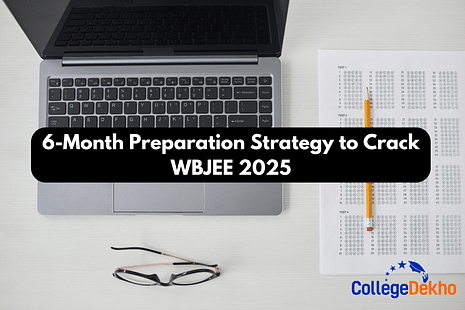
6-Month Preparation Strategy to Crack WBJEE 2025: Cracking a super competitive exam as WBJEE can seem a bit tough but with a dedicated preparation strategy, you can ace the exam with flying colours. In this article, we will be talking about a full-proof 6-month preparation strategy to crack WBJEE 2025. This 6 month strategy to qualify WBJEE 2025 exam has been structured by the exam experts keeping in mind the the comprehensive syllabus, the weightage of important topics, and the best approach to optimize preparation within the available timeframe. The plan is designed to help students build a solid foundation in Physics, Chemistry, and Mathematics, while also honing problem-solving skills, time management, and exam-taking strategies. By following these tips, you will be able to increase your chances of qualifying the exam with an amazing score. The article here details about the 6-month preparation strategy to crack WBJEE 2025. Go through it to get into the minute details and start preparing.
Also Check - WBJEE 2025 Mathematics Topic Wise Weightage & Important Topics
Quick Links:
6-Month Preparation Strategy to Crack WBJEE 2025
Through the points below, we will be discussing month-by-month strategy along with the objectives of studying for WBJEE 2025 and helping you crack it with good marks:-
Month 1: Build foundation & understand syllabus
Objective: Work on the basics of Physics, Chemistry, & Mathematics and verse yourself with the complete syllabus & pattern.
Week 1-2: Focus on Mathematics basics: Algebra, Trigonometry, and Coordinate Geometry.
Week 3-4: Focus on Physics and Chemistry fundamentals. Physics: Mechanics (Kinematics, Newton's Laws of Motion), Chemistry: Focus on Inorganic Chemistry and the basics of Organic and Physical Chemistry.
Study for 6-7 hours.
2 hours dedicated to theory (reading and notes).
2 hours of practice (solving problems from each subject).
1 hour for revision of previous day's concepts.
1 hour for weekly mock tests or practice papers.
Month 2: Master Core Concepts & Start Solving Problems
Objective: Start solving problems on a regular basis to enhance problem-solving skills and apply concepts.
Week 1-2: Focus on Mathematics (Calculus and Vectors).
Week 3-4: Focus on Physics (Electrostatics, Current Electricity, Work, and Energy), Chemistry: Delve deeper into Physical Chemistry (Mole concept, Thermodynamics, Equilibrium) and Organic Chemistry (Hydrocarbons, Alcohols, and Ethers).
6-8 hours of study.
2 hours theory revision and understanding core concepts.
3 hours problem-solving from practice books.
1 hour mock test practice or previous year questions.
1 hour focused revision.
Month 3: Strengthen Problem-Solving & Start Timed Practice
Objective: Work on your time management skills by solving problems with a time limit.
Week 1-2: Mathematics: Calculus (Differentiation, Integration, and Applications) and Probability.
Week 3-4: Physics: Magnetism, Optics, and Modern Physics, Chemistry: Organic Chemistry (Aromatic Compounds, Polymers) and Inorganic Chemistry (Transition Elements, Coordination Chemistry).
6-8 hours of study.
3 hours problem-solving under time constraints.
2 hours theoretical revision.
1 hour mock test or practice with WBJEE previous year question papers .
1 hour of revision for weak areas.
Also Check - WBJEE 2025 Chemistry Topic-Wise Weightage & List of Important Topics
Month 4: Focus on High-Weightage Topics & Take Full-Length Mock Tests
Objective: Deep dive into high-weightage topics. Start taking full-length mock tests to simulate exam conditions.
Week 1-2: Focus on high-weightage topics in Mathematics (Probability, Coordinate Geometry, and Advanced Algebra).
Week 3-4: Focus on high-weightage topics in Physics (Thermodynamics, Electrostatics, and Optics), Chemistry: Strengthen understanding of Physical Chemistry (Electrochemistry, Kinetics), and Organic Chemistry (Carboxylic acids, Alcohols).
6-8 hours of study.
3 hours focused practice (time-bound problem-solving).
1 hour reading theory and revising weak concepts.
2 hours for full-length mock tests or practice papers (on alternate days).
1 hour for error analysis of mock tests.
Month 5: Revision and Identify Weak Areas
Objective: Identify weak areas and revise all subjects. Focus on strengthening weaker topics.
Week 1-2: Revise Mathematics (Calculus, Probability, Algebra). Focus on Physics (Electrostatics, Thermodynamics).
Week 3-4: Revise Chemistry (Organic Chemistry, Coordination Chemistry). Review all mock test results, and improve weak areas and incorrect responses.
7-9 hours of study.
3 hours of solving problems from weak areas.
2 hours of revisiting theoretical concepts.
2 hours of mock tests or previous year papers.
1 hour for revising mistakes and consolidating knowledge.
Month 6: Final Revision & Focus on Time Management
Objective: Ensure complete revision of the entire syllabus. Focus on final touch-ups, speed, and time management.
Week 1-2: Final revision of Mathematics (last-minute revision of key formulas and problems).
Week 3-4: Final revision of Physics and Chemistry (last-minute important reactions, laws, and formulas).
7-9 hours of study.
4 hours of timed mock tests (take at least 2 full-length mock tests every week).
2 hours revising high-weightage topics.
1 hour working on time management (practice full exams under timed conditions).
1 hour focused revision of formulae and key concepts.
WBJEE 2025 General Preparation Tips
Below mentioned are some general preparation tips that you can include in your strategies to hone your preparation for the WBJEE 2025 exam:-
Weekly Revision: Every Sunday, revise everything you have studied during the week. Don't let any topic pile up.
Consistent Mock Tests: Take at least 2-3 full-length mock tests per week to simulate real exam conditions.
Focus on Weak Areas: After each WBJEE 2025 mock test , analyze the mistakes and work on your weak areas.
Healthy Lifestyle: Keep your body and mind in peak condition with enough sleep (7-8 hours), regular exercise, and a balanced diet.
Stay Positive & Motivated: Keep your goal in mind. Stay positive and track your progress to stay motivated.
Related Articles
| What is the Difference Between WBJEE and JEE Main? | Is WBJEE Tougher than BITSAT? |
|---|---|
| Are WBJEE and JEE Main Syllabus the Same? | - |
Are you feeling lost and unsure about what career path to take after completing 12th standard?
Say goodbye to confusion and hello to a bright future!

Was this article helpful?


















Similar Articles
KCET 2025 Chemistry Syllabus - Chapter-Wise Topics, Weightage
KCET 2025 Mathematics Syllabus - Important Topics, PDF and Weightage
KCET 2025 OMR Sheet – Sample (PDF Download), Instructions, Carbon Copy
KCET Login 2025 - User ID, Application Number, Password, Steps to Retrieve
MHT CET 2025 - Admit Card (April 5), Syllabus, Mock Test (Released), Exam Pattern, Preparation Tips, Results, Cutoff
MHT CET 2025 Syllabus (Released): Check Subject Wise, Download PDF